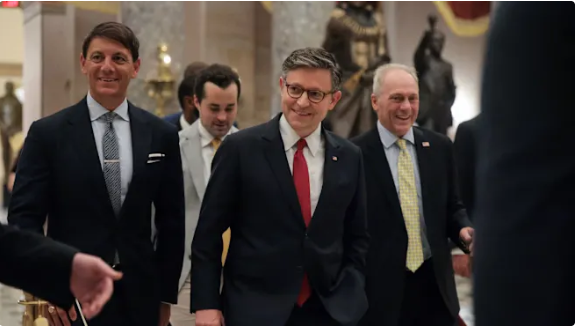The House of Representatives sent Donald Trump's "Big, Beautiful Bill" to the president for his signature Thursday after a record-setting and emotional debate over a piece of legislation that will be felt across the economy for years to come.
The final vote was 218-214, with just two Republicans voting no in the end.
House Speaker Mike Johnson whittled down a list of over two dozen GOP holdouts who were objecting to the bill as recently as Wednesday to just Reps. Thomas Massie of Kentucky and Brian Fitzpatrick of Pennsylvania.
White House Press Secretary Karoline Leavitt quickly announced after the vote ended that Trump would sign the bill on Friday at 5 p.m. ET at a White House ceremony, adding "this bill is going to create an economic boom for the United States of America."
The approval came after a pressure campaign from the White House and yet another all-night session on Capitol Hill that satisfied Republican holdouts concerned about the multitrillion-dollar price tag and healthcare cuts.
The vote also came after Democratic Minority Leader Hakeem Jeffries held the floor — for what C-SPAN confirmed was a new length record — to lambast the bill for more than eight hours. He said that he spoke so that the final vote would happen “in the light of day” and at another point calling the legislation a "crime scene."
But Johnson and his colleagues celebrated final passage soon after Jeffries yielded, with the House speaker saying just before the vote commenced that "this day is a hugely important one" and describing it as part of a long list of recent Trump wins.
He and his colleagues soaked in a victory many were skeptical could ever happen — the weaving together of a wide array of Republican priorities into a single bill and sending it to Trump before his self-imposed July 4 deadline.
What in the end appears to have allowed Johnson to move many of these recalcitrant lawmakers into the yes column were not any changes to the bill itself — today's vote approved the 870-page bill that passed the Senate earlier this week with zero changes — but with promises from Trump of things like executive actions to address their concerns.
Major changes — and a giant price tag
The back-and-forth Thursday was just the latest twist in days of negotiations over a reconciliation package that is set to reshape large swathes of the US economy, especially in areas of taxes, energy, and healthcare.
The package also includes a $5 trillion debt ceiling increase and is projected to unleash new borrowing that will lead the US national debt to surpass $40 trillion in the coming years.
Economists have likewise noted the final price tag, which could lead to $4 trillion in new debt over the coming decade, and critiqued an accounting gimmick Republicans employed to hide much of that red ink.
It's a bill also set to be felt in American pocketbooks with provisions like no taxes on some tips, cuts to student loans and the Pell Grant program, an increase in state tax deductions, and a range of other provisions, even so-called MAGA accounts for young children.
The process proved exceptionally contentious in recent days, largely over the healthcare portion of the bill, which appears set to extract hundreds of billions in government savings but cause millions to lose their coverage.

That portion of the bill saw provisions added and subtracted in rapid succession during the Senate debate, sending solar stocks gyrating. It ended with a final product that didn't include at least one of the harshest ideas, but is nevertheless set to have the US government move away from any significant role in renewable energy in the years ahead.
A first step will be felt quickly with a plan to eliminate electric vehicle credits on Sept. 30 of this year.
A growing focus on selling the bill
Democrats, for their part, promised to make the bill a political albatross for Republicans and have signaled plans to talk nonstop about the package between now and next year's midterm election.
"Don't ever lecture us about fiscal responsibility: Not now, not ever," Jeffries said at one point in his Thursday morning speech. Sen. Elizabeth Warren of Massachusetts said in her own reaction after the vote: "We will never let the Republican Party forget."
A particular political focus is expected to be on the healthcare provisions that, according to an accounting from the Congressional Budget Office that came in over the weekend, could cause 11.8 million additional Americans to become uninsured by 2034.
A series of polls has also shown declines in the overall public support for the bill as the focus on healthcare has intensified. Even a recent Fox News national poll found a 21-point gap between those who say they are opposed (59%) and those who say they are in favor (38%).

The Democratic opposition also comes as Republicans clearly have mixed feelings about the bill with some of the healthcare cuts.
Some Republicans continue to slam that portion of the bill as too politically painful.
Meanwhile, some of their colleagues look at the exact same provisions and say the cuts are not deep enough to improve the fiscal situation.
In just one example of Republican tensions, GOP Rep. Keith Self of Texas posted Wednesday just hours before voting began that the bill was "morally and fiscally bankrupt," before then voting yes on Thursday and saying "issues have now been addressed" even as he acknowledged "the bill is not perfect."